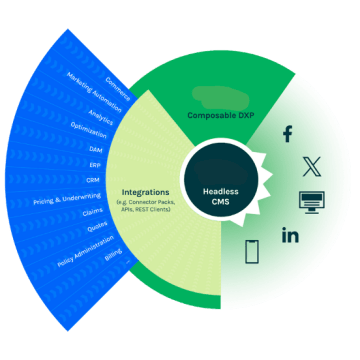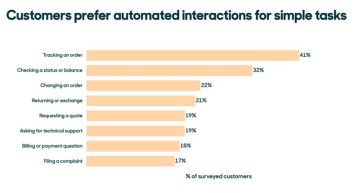Self-Service Portal as the Gateway to 21st Century Customer Service
2 years ago
Self-contained portals have become an integral part of the modern digital era, providing users with quick and convenient ways to address their needs and requests. These self-service platforms offer a wide range of services and capabilities, enabling easy interaction and management of various matters without the need for physical presence or additional personnel involvement. In this article, we will focus on the importance and benefits of self-service portals for both users and service providers, and how this innovative technology is shaping our digital experience.

70 % of Customers Prefer Online Solutions
In recent years, it has become increasingly evident that customers prefer handling their requests online rather than in person. There are several reasons why this preference is growing:
Convenience and Availability: Online platforms are available 24/7, allowing customers to address their requests and perform transactions anytime and from anywhere, regardless of business hours or geographic location.
Speed and Efficiency: Resolving issues online can be faster and more efficient than visiting a physical location or making a phone call. Customers can immediately find the necessary information, make payments, or get support through chat.
Limiting Personal Contact: Especially during the COVID-19 pandemic, customers began preferring online solutions as a safer alternative, minimizing the risk of infection.
Personalized Experience: Online platforms often offer personalized interaction and recommendations based on customer history and preferences, enhancing the overall customer experience.
Given these factors, organizations are increasingly focusing on providing comprehensive and user-friendly online self-service portals that meet the growing needs and preferences of customers. These portals not only improve customer satisfaction but also reduce customer support and operational costs.

The Biggest Accelerator of Self-Service: E-commerce
Since the rise of online grocery shopping, the circle has closed. E-shops have become a daily necessity, and without online transactions, we wouldn't even eat. E-shops have set a new standard for customer experience, followed closely by banks and the management of our accounts.
Self-Service Portal – Digital Experience Platform (DXP)
A self-service portal in 2024 is an online platform that allows users to perform various tasks and transactions without the need for physical interaction with staff or operators. Its primary goal is to provide users with a convenient and efficient way to address their needs and requests.
DXP platforms are key tools for organizations aiming to deliver comprehensive digital experiences to their customers. Some of the top-rated DXP platforms include:
Adobe Experience Manager (AEM): AEM is a comprehensive platform for managing digital experiences, combining content management, digital marketing, and data analysis. It is valued for its scalability, personalization, and integration with other Adobe tools.
Acquia Digital Experience Platform: Acquia offers a complete solution for managing digital experiences, including content management, personalization, e-commerce, and analytics. It is praised for its open architecture and flexibility.
Episerver Digital Experience Platform: Episerver provides solutions for content management, e-commerce, personalization, and digital marketing. It is appreciated for its ease of use and quick implementation.
IBM Digital Experience Manager: IBM DX Manager is a comprehensive platform for managing digital experiences, including content management, e-commerce, digital marketing, and analytics. It is valued for its scalability and security.
Liferay Digital Experience Platform: Liferay DXP is an open-source platform for managing digital experiences, combining content management, social collaboration, e-commerce, and personalization. It is praised for its flexibility and modularity.
Microsoft Dynamics 365: Dynamics 365 offers an integrated solution for managing customer interactions, marketing, sales, and services. It is valued for its easy integration with other Microsoft products and a wide range of features.
Oracle CX Cloud Suite: Oracle CX Cloud Suite is a set of cloud applications for managing customer experiences, including content management, e-commerce, marketing automation, and analytics. It is praised for its scalability and flexibility.
Salesforce Customer 360 Platform: Salesforce Customer 360 Platform enables organizations to integrate and personalize customer experiences across various channels, including websites, mobile apps, and social media.
SAP Customer Experience (CX): SAP CX offers solutions for managing customer interactions, marketing automation, e-commerce, and analytics. It is valued for its integration with other SAP products and ability to provide comprehensive customer experiences.
Sitecore Experience Platform: Sitecore offers a wide range of functions for content management, personalization, digital marketing, and analytics. Its strength lies in its ability to deliver relevant content and experiences for each individual user.
Consider Your Company's Specifics When Choosing
When selecting a digital experience platform (DXP), it is crucial to consider several factors that can significantly impact your business's success. Here are five important aspects:
Flexibility and Extensibility: Look for a platform that is flexible and allows easy expansion with new features and integrations. The digital ecosystem is constantly evolving, and it is essential to have technology that can quickly respond to new demands and trends.
Personalization and User Experience: The DXP should offer advanced personalization options for content and user experiences. The ability to target content and features to individual user needs can greatly enhance engagement and loyalty.
Security and Data Protection: Data security is crucial for user trust and compliance with regulations like GDPR. Choose a DXP that offers robust security mechanisms and a transparent privacy policy.
Support for Omnichannel Strategies: Today, users move between various devices and channels. Your DXP should enable a consistent and integrated experience across different platforms, including web, mobile apps, social media, etc.
Analytics and Optimization: The ability to measure and analyze user behavior and the performance of digital experiences is key to successfully managing and optimizing your digital strategy. Select a DXP with advanced analytics tools and testing capabilities to continually improve your digital initiatives' performance.
If I had to choose one user trend for self-service portals in 2024, it would be the experience economy.
If we momentarily abstract from AI, data, and blockchain – which are and will be part of everything – we can consider them as part of our atmosphere and the wind in the sails of our ships. Then, we can look for where we should sail.
The experience economy is a concept focusing on the value customers derive from experiences associated with products or services, rather than the products or services themselves. This approach has become increasingly relevant today, as consumer preferences shift from material possessions to experiences and emotions. This is doubly true for DXP portals.
Amazon: Amazon offers an experience economy through personalized product recommendations, interactive reviews and ratings, community discussion forums, and the Amazon Prime program, which includes fast delivery, exclusive deals, and access to streaming video and music.
Airbnb: Airbnb creates an experience economy by allowing users to discover and book unique and authentic experiences while traveling, including excursions, workshops, courses, and other experiences hosted by local hosts.
Progressive Insurance: Progressive leverages the experience economy on its DXP portal through interactive tools and features that help users better understand their insurance and coverage options. This includes online simulators, interactive guides, and videos explaining complex insurance topics.
Bank of America: Provides budgeting and financial goal planning tools. Users can set their goals related to savings, investments, or debt repayment and track their progress directly on the portal.
If I had to choose one technological trend for self-service portals in 2024, it would be interoperability and integration capability!
DXP portals must be able to integrate with existing systems and applications within the organization, such as CRM systems, ERP systems, analytical tools, and more. This integration enables data and process sharing across the organization and ensures consistent and integrated digital experiences.

Conclusion
Self-service portals are an essential element of digital transformation, and their importance will continue to grow with technological advancements and changing consumer preferences. They are tools that bring benefits to both customers and service providers and are becoming an integral part of our digital environment. If this article has inspired you in any way or if you feel any topic is missing, I would greatly appreciate your feedback.
